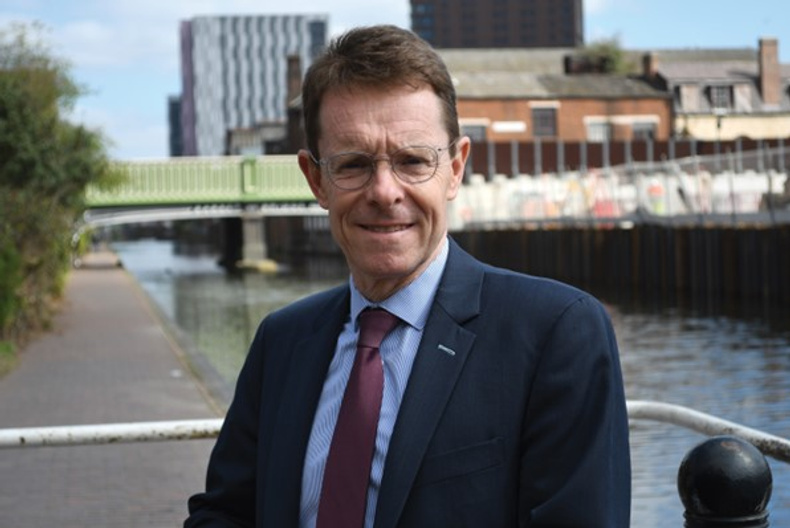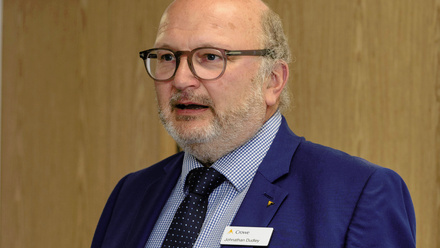What Does Andy Street’s mayoral manifesto mean for businesses?

Written by the policy department of Greater Birmingham Chambers of Commerce
The final report of the Business Commission West Midlands (BCWM) was launched at a Mayoral Hustings with candidates Andy Street and Richard Parker on 19 March, in which each responded to the 90 recommendations included in the final report of the BCWM. Click here to view the video from this event.
Following on from this event, and with the upcoming Mayoral elections on 2 May, this blog summarises the manifesto of Andy Street (pictured), Conservative Candidate for West Midlands Mayor.
It will outline the key areas of what he calls “the plan to keep putting the West Midlands first”, what some of the main points mean for businesses, and how they align with the findings of the BCWM research.
About the Business Commission West Midlands
The BCWM provides a roadmap for unlocking business growth across the region. The Commission has been delivered by the Greater Birmingham Chambers of Commerce’s Insight & Intelligence Unit, in partnership with the Black Country and Coventry & Warwickshire Chambers of Commerce.
Between October and November 2023, over 130 organisations participated in the evidence hearing stage of the Commission and a further 400 local businesses were surveyed as part of the evidence base for the Roadmap for Growth.
Following the publication of this Roadmap, the Chambers are now working with stakeholders and partners to make the Commission’s recommendations a reality as well as directly supporting businesses in embracing the opportunities and overcoming the challenges identified.
For more information about the BCWM, please click here.
Andy Street’s manifesto pledges
Delivering the 2040 transport plan
- Prioritise and develop the business cases for new extensions to the Metro network, and open/make business cases for new railway stations- In order to better connect the region, Andy Street’s manifesto places a particular focus on potential new Metro lines and train stations (more information on pages 32-38).
- Ensure that HS2 gets built from London to Birmingham on time and use the opportunity of HS2 to secure more inward investment for the region- To compensate for the cancellation of HS2’s northern leg, Andy Street’s manifesto outlines plans to lobby central government for better connections between the West Midlands, to Manchester and to Leeds (more information on pages 30-36).
- Keeping public transport fares low - Andy Street’s manifesto commits to keeping fares as low as possible while running public transport services in the most financially responsible way.
Building the homes we need whilst protecting the green belt
- Keep building homes faster than the target of 15,257 new homes every year- Andy Street’s manifesto commits to building a greater number of new homes every year than targeted – and indeed, reviewing the goal of 215,000 new homes by 2031 to see if the region could be more ambitious on this- with the aim that more local people can buy or rent their own home. The manifesto also states a commitment to 'double down’ on a ‘Brownfield First’ approach, which seeks to clean up derelict industrial sites to build homes on whilst protecting green spaces.
- Work with local councils to bolster their planning departments - Andy Street’s manifesto sets out a number of pledges on planning. These include encouraging local authorities in the West Midlands to participate actively in the Department for Levelling Up, Housing and Communities' Digital Planning programme, using digital technology to speed up plan-making and development. Additionally, he pledges to support local authority planning departments where possible using WMCA resources and staff, to speed up the development process in the region, and champion the case for Government to permit the ringfencing of income for council planning departments. Further, Andy Street states plans to commission an expert review (“Land Commission 2”) into the housing & regeneration progress and powers of the WMCA and the West Midlands Mayor, including examining whether the Combined Authority should have independent Compulsory Purchase powers to speed up developments, and to commission further work to develop new funding mechanisms to deliver new housebuilding and regeneration projects.
Creating jobs and opportunities for everyone
- Creating 125,000 new jobs and 300,000 training opportunities over the next four years- part of an ambition to grow the West Midlands faster than London between 2024 and 2030, Andy Street’s manifesto pledges to create 125,000 new jobs and 300,000 training opportunities over the 2024-2028 mayoral term, should he be elected.
- Tackle youth unemployment, invest in apprenticeships, and introduce careers advisors for 40 schools- Andy Street’s manifesto pledges to explore new ways for employers to support with careers advice, for example by making any work they do supporting careers education tax deductible. On apprenticeships, the manifesto commits to supporting young people to undertake apprenticeships and scaling up creative bootcamps and skills provision to meet the skills gaps in the sector, including bootcamps, apprenticeships and sector-based work academy programmes.
- Growing new and existing business sector clusters- The manifesto sets out an ambition to drive sectoral growth through a cluster model, geographically concentrating interconnected businesses, suppliers and associated institutions in particular fields in order to drive investment.
Restoring pride in our towns and city centres
- Support regeneration plans for local centres- Andy Street’s manifesto pledges to implement number of priority schemes in local centres, for example: Portersfield in Dudley, Mell Square in Solihull, The Gracechurch Centre in Sutton Coldfield, Ravenscourt in Brownhills and the Harborne Royalty. This is intended to support businesses in the hospitality and retail industries by making town centres more attractive leisure destinations.
Helping reduce energy bills and tackling climate change
- Continue making our public transport cleaner and greener- In addition to improving the reliability, frequency and cost effectiveness of public transport, Andy Street’s transport strategy also includes delivering more electric buses and trains, building more cycle routes and expanding the electric vehicle charging network. Other proposals on net zero in the manifesto include supporting Chamber Patron Birmingham Airport in reaching their net zero target by 2033, protecting green spaces, and retrofitting over 50,000 homes with energy saving measures by 2028, using the funding secured in
The Deeper Devolution Deal
- Make the West Midlands the “retrofit” capital of the UK and Promote the West Midlands’ role at the centre of the shift to electric vehicles- Andy Street’s manifesto outlines aims to have successfully retrofitted over 50,000 homes across the region by 2028, to create thousands of jobs for retrofit and heating, and to ensure that skills and training funding is targeted to provide more training places for the new green jobs. The manifesto also states plans to accelerate the West Midlands rollout of electric vehicle charging points at homes, businesses and public places, and capitalise on the growth of electric charging point engineering, planning, installation and maintenance to create new jobs across the West Midlands.
Getting the best financial deal for the region
Part of Andy Street’s plan for the West Midlands includes ‘getting the best financial deal for the region.’ Within this, he states commitments to make sure investment is spread fairly across the region, not just in Birmingham City Centre.
He also commits to bringing in billions more government funding and private sector investment to create new jobs in the West Midlands, and to maintaining our position as the leading inward investment region outside London - more information on this pledge can be found on pages 136-138.
In relation to the topics the manifesto has referenced, the BCWM research found that:
Transport
- 70 per cent of firms expressed a need for improving public transport networks and it was cited that the region has too many areas that are poorly connected.
- The Government’s decision to curtail HS2 north of Birmingham has been met with strong opposition from the business community due to its negative impact on connectivity and investor confidence in the region. Businesses have called for local authorities to maximise the potential socio-economic value that a project the scale of HS2 generates – with a particular focus on harnessing the wider regeneration opportunities that the delivery of Curzon Street and Interchange Stations bring to the region. They have also called for regional authorities to protect the funding and accelerate the delivery of the Midlands Rail Hub in order to bring about greater inter and intra- regional connectivity.
- Travel costs in the region have presented particular issues of affordability for younger employees and students.
Housing and planning
- 47 per cent of firms feel it is important to improve planning regulation to speed up the delivery of infrastructure projects and the construction of employment sites, in addition to making it easier and more time-efficient to navigate public procurement processes.
Jobs and skills
- Local firms have expressed an appetite for more interaction with academic institutions to shape training around industry skills needs, particularly to help young people prepare for the world of work.
- The success of the cluster model for economic growth was highlighted by a selection of manufacturers that operated in cluster sites. Nevertheless, it was also discussed that physical proximity is easier to achieve in industries such as technology and business, professional and financial services than amongst manufacturers, which require larger volumes of specialist employment land and premises, of which there is perceived to be a shortage in the region.
High streets
- The COVID-19 pandemic has had a profound impact on the region’s towns and high streets, leading many businesses – particularly in sectors such as hospitality and retail - to close while those that remain open have seen a notable decline in visitor numbers and the overall vibrancy of these spaces.
Net zero
- Businesses have called for a greater role in developing the region’s energy strategy alongside the Combined Authority and a commitment to improved energy storage solutions to improve energy resilience.
- 78 per cent of firms felt that it was important to ensure we have the energy resilience to meet future requirements.
- 61 per cent of firms felt that it was important to provide support for businesses to invest in net zero measures and transition away from fossil fuels.
Investment
- Businesses expressed sentiment that West Midlands residents struggle to see the West Midlands as ‘one whole’ rather thinking of the constituent areas as separate entities. Firms commented that this has an impact on the region’s effectiveness to attract and deploy investment to benefit all Combined Authority areas.
- Businesses called for a cohesive West Midlands international strategy to promote the region on the global stage with one voice, which will be a key step in attracting investment into the region as a whole.
- While the West Midlands is currently the leading inward investment region outside of London, regional businesses highlighted that London-based businesses still receive a far greater share of venture capital and private equity investment due to many investment firms being London based and local businesses not being ‘investment ready’.
Next Steps for the BCWM
The Business Commission West Midlands Hub is published on the Greater Birmingham Chambers of Commerce website and includes reactions to and comments on the Business Commission West Midlands. The Interim Report, which was published in February 2024 and set out the key thematic challenges related to business growth across the region, is also available on the Hub and the Final Report, published in March 2024, lists over 90 recommendations for local, regional and national stakeholders that would help to unlock growth and prosperity across the region.
The Greater Birmingham Chambers of Commerce will use the coming months to engage with local, regional and national political figures and other relevant stakeholders in order to champion and promote the recommendations made in the report.
In addition, we will look to undertake deeper dives across the other levers for growth and cross cutting enablers and hold roundtables with relevant regional and national stakeholders.
Conducting this exercise will give us a more nuanced understanding of the challenges and opportunities facing businesses in these areas and help track progress against the recommendations we have put forward.
In March 2025, we will host a formal review in which we will assess which recommendations have been implemented and where further work is required to unlock growth and drive prosperity across the West Midlands.
Further Information about the West Midlands Mayoral Election
Find out more about the West Midlands Mayoral election.
Candidates for the May 2024 Mayoral Election are listed below (in alphabetical order by surname) with links to web pages with further information on their priorities for the region.
- Siobhan Harper-Nunes, Green Party
- Richard Parker, Labour
- Andy Street, Conservative (incumbent)
- Sunny Virk, Liberal Democrat
- Elaine Williams, Reform UK
- Akhmed Yakoob, Independent (no web page available)



